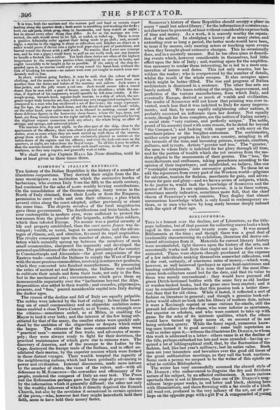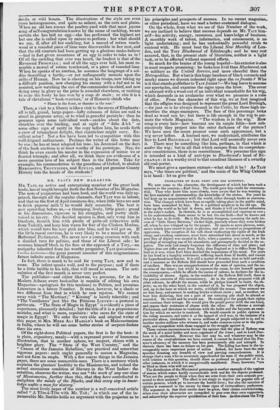BIBLIOPHOBIA.
Tars is a lament over the decline, not of Literature, as the title- page indicates, but of that passion for collecting scarce books which raged in this country about twenty years ago. It was named Bibliomania at the time ; and though there was a good deal of irrationality characterizing its exhibition, literature did derive col- lateral advantages from,it. Materials for correct literary history were accumulated, light thrown upon the history of the arts, and occasionally works and facts that ought not to have died were re- animated. These were objects cheaply purchased at the expense of a few individuals making themselves somewhat ridiculous, and at the cost, certainly, of enormous sums of money,—which were, however, as well bestowed (perhaps) as upon kept-mistresses and hunting establishments. It is true that many of the most illus- trious book-collectors cared but for the date, and that its value to them was merely conventional : they would have pursued old green Dutch-bottomed bottles with the same fury as old leather or wooden-backed books, had the game once been started; and it may be considered fortunate that this passion took a better direc- tion than that for old china. While it lasted, it reflected a sort of fashion on literature in general; and though a genuine book-col- lector would admit no book into his library of modern date, unless it were a Roxburgh reprint or some curious fac-simile, still the pursuit led others into the chase, who were inferior as sportsmen, but superior as scholars, and who were content to take up with game for the sake of its intrinsic qualities, which the others would have turned up their noses at, on account of its not being orthodox quarry. While the fancy raged, numerous know- ing-ones turned it to good account : some built reputation as well as riches upon it,—witness the illustrious Dr. DI-BDIN, to whom this work is addressed in a letter : others came in at the decline of the tide, perhaps embarked too late and were stranded—having ac- quired a lot of bibliographical stuff, that, by the fluctuation of the fashion, had, like last year's millinery, lost its entire value. Such men are your lamenters and bewailers over the good old times of the great subhastalian meetings, as they call the book auctions. Some such a person we suspect to be the writer of this epistle on what he entitles Bibliophobia. The writer has very successfully assumed the absurd style of Dr. Diann( ; who endeavoured to disguise the dry and frivolous, nature of his subject, by an affected enthusiasm. A more curious. spectacle there is not in literature, than one of Dr. DIBDIN'S mag- nificent large-paper works, in red letter and black, shining here, with illuminations, and there frowning with a fee simile of a black, old wood-cut, produced in the very infancy of the art, set off per-- haps on the opposite page with a gilt Por A compounded of.y..atuiiM 'devils or wild beasts. The illustrations of the style are even :more heterogeneous, and quite as salient, as the cuts and plates. When an old hen rouses the poultry-yard with that most joyous song of self-congratulation known by the name of cackling, we are certain she has laid an egg—she has performed the highest act but one she is called upon by nature to perform : but what should we say, if, after all her cackling, but a morsel of rotten touch- wood or a rounded piece of lime were discoverable in her nest, and that the old creature had been getting up a glorious make-believe —had in fact given assurance of an egg in order to take us in ? Of all the cackling that ever was heard, the loudest is that of the . Reverend FROGNALL ; and of all the eggs ever laid, his most re- semble a morsel of rotten touchwood, or a piece of rounded lime. When he speaks of an auction, he assumes the language of a sol- dier describing .a battle,—or not unfrequently mounts upon the stilts of HOMER. Now he is cheering on his troops, now taking up a difficult position, now charging his enemy with a bid not to be resisted, now watching the eye of the commander-in-chief, and now dying away in glory as the prize is awarded elsewhere, or rushing to seize the booty he has won by a coup de main; or else it is a tale of chivalrous " book-warriors," or of Homeric chiefs who
" Flame in the front, or thunder in the rear."
Then, a visit to a library is like a visit to the caves of Elephanta all is tall, grand, large-paper—lofty columns of folios are said to stand in gorgeous array, or to wind in graceful peristyle : then he pounces upon some individual work—cackles about the date, chuckles over the binding, and at sight of " folio A b b " or some other sign of rarity in the copy before him, he sends forth a crow of triumphant delight, that chanticleer might envy. Ex- cellent actor ! Not a few have been led to sympathize with this well-feigned enthusiasm. Perhaps the writer of this letter may be one ; he has at least adopted his tone . his Jeremiad on the days of the book auctions is at least worthy of his prototype. Nay, we think he even excels his master in the expression of mimic wo or fancied triumph; and after all, we think there are evidences of a more genuine love of his subject than in the Doctor. Take for example, his commendation to the guardians of Oxford, to abolish HERODOTUS, THUCYDIDES, and EUCLID, and put genuine County History into the bands of the students !




























 Previous page
Previous page